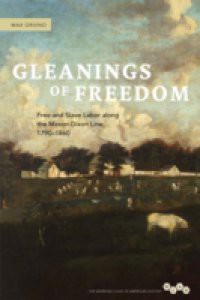In the late eighteenth and early nineteenth centuries, farmers and planters in the hinterlands of Baltimore, Maryland, cobbled together workforces from a diverse labor population of black and white apprentices, indentured servants, slaves, and hired workers. The Upper South during this period presents a unique perspective on how free and slave labor systems coexisted and interacted during a time when slavery and free labor were moving apart both geographically and ideologically. Gleanings of Freedom examines the intertwined lives of the poor whites, slaves, and free blacks who lived and worked along the Mason-Dixon Line in the decades preceding the Civil War._x000B__x000B_Max Grivno closely examines a handful of counties in northern Maryland and southern Pennsylvania to illustrate how these rural local communities represented issues of national historical significance, including the dynamic, multifaceted relationship between slave and free labor, the lives of free black and white farmhands, the domestic slave trade's impact on the people of the Upper South, and the struggles of enslaved and free blacks to liberate themselves and their families from bondage through immediate and delayed manumissions. Grivno reconstructs the economy of this wheat-producing region to illustrate how the erratic demand for labor shaped negotiations between employers and their workers. Gleanings of Freedom illuminates the ties between the economies of the Upper and Lower South, showing how the insatiable demand for labor on the cotton and sugar plantations of the Deep South drew thousands of slaves southward and drove those who remained on the sectional border to fight for their freedom through shrewd negotiations and violent resistance._x000B__x000B_Deftly drawing from court records, the diaries, letters, and ledgers of farmers and small planters, travelers' accounts, and testimonies of slaves and their masters, Gleanings of Freedom reconstructs how these poorest of southerners eked out their livings and struggled to maintain their families and their freedom in the often unforgiving rural economy.

